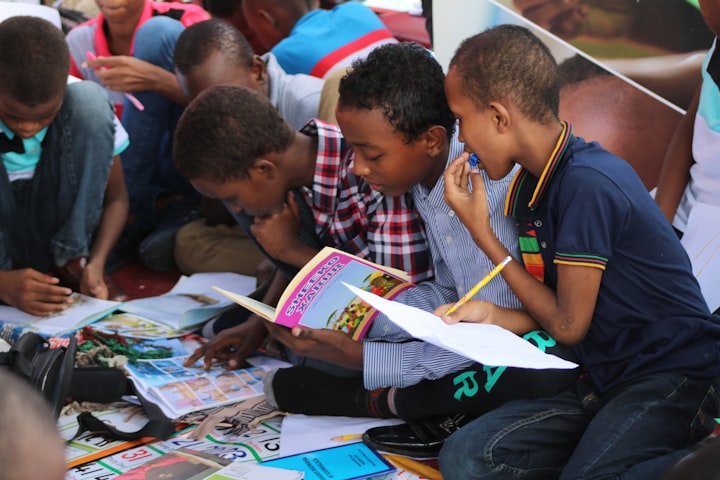10 Ways to Awaken the Bibliophile in Your Child
10 tactics to get kids reading

Get Kids Reading
There's no arguing that reading is good for us. Reading can transport us to faraway places, help us understand complex social hierarchies, and give us cues on how to act appropriately when faced with unfamiliar situations. Fiction can help us see the world through a different set of eyes, making us more empathetic (Oatley, 2008; Paul, 2012).
Reading is also a fundamental part of everyday life, and just like any other skill, it needs practice to become fluent. It’s a skill that some kids are resistant to hone. This lack of desire for reading can be due to a plethora of reasons: learning disabilities like dyslexia, delayed mental development, difficulty reading at grade level, reading not being promoted in the home, reading being perceived as tedious, or the inability to simply sit still. If you have a child falling behind in school due to a lack of enthusiasm for reading, here are a few fun, non-traditional gateways to get kids reading.
1. Read to and with your kids.
Kids follow the example of their parents, and if parents don't read, it's more than likely their kids won't either. If you want your kids to value books and learning, you must, must, must read, either to them or with them, aloud. Spending time every day reading with your child will not only send the message that you think reading is important, but it will also communicate that you think they are essential, which speaks volumes about fostering a positive parent-child relationship.
Reading to your child shouldn't end when they are no longer tiny, but this bedtime tradition can continue well into middle school and beyond. If bedtime doesn't work, you can institute family reading time during the day or in the evening as a way of unwinding from the day, taking the opportunity to share books.
2. Tempt them with forbidden fruit.
Make books your kids think they shouldn't read (books on human sexual reproduction, etc.) slightly more visible or blatantly left out for them to find. Also, push banned books. If a kid is presented with something adults don't want them to read, it's all the more tempting. Pajiba published a terrific list of 30 challenged kid and young adult novels.
3. Let your kids read below their grade level.
Reading should be fun, and if you want your kids to get into reading, let them read things that aren't as challenging. If you take your child book shopping and they’re drawn to items that are two and three-grade levels lower than their actual reading level, say yes to their choices. If a child is forced to read recreational books that aren't relaxing or enjoyable, guess what! They won't read, especially if they're already struggling with grade-level material. So if your fourth grader has picked out a stack of picture books, encourage them and engage them. I have written an article on the benefits of picture books and visual literacy.
4. Comic books and graphic novels are not the enemy.
Comic books are seeing a renaissance, and this art form has many kid-friendly options. Graphic novels are a great stepping stone into reading chapter books and full-fledged novels. Many book series have graphic novel adaptations; The Baby-Sitter's Club, I Survived, and Wings of Fire can all be found as graphic novels. Easing your child into a page filled with text with a graphic novel adaptation is the perfect gateway to building a love for reading and books. Below is a list of graphic novels kids love.
- Girl Genius (Hugo Award-Winning) is created by Phil and Kaja Foglio and geared towards teens and up. However, many fans say they read this quirky Victorian-set comic to their kids (check out the online archive here).
- Mouse Guard (Eisner Award-Winning) is written and illustrated by David Petersen and is suitable for all ages though those as young as eight can sit solo in this imaginative world where mice wield swords and live in castles.
- Lookouts (available both in print and digitally), written by Ben McCool and illustrated by Robb Mommaerts, is another all-age-friendly series about a guild of magical boy scouts. While it may be more of a hit with boys than girls, don't despair, Penny Arcade has created Daughters of the Eyrewood: The Tithe, which is the female equivalent to Lookouts.
- PS238 and Nodwick, created by Aaron Williams, offer good clean fun and are suitable for all ages. PS238 is a new take on superheroes, while Nodwick follows a small group of misadventures.
- Dogman by Dav Pilkey is a massive hit with elementary school kids, and with good reason. These books are wrought with potty humor, slapstick, and flip-o-ramas.
If you would like to dive further down the rabbit hole of comics and graphic novels, try Wikipedia for more award-winning titles. But be warned, not all are kid-friendly. In addition, Marvel and DC Comics have kid versions of their big titles as well as chapter books. Lastly, Kidjutsu specializes in comics for kids.
If you try comics and your kids are into them, you may also want to give the manga a whirl. iFanboy has a great article listing some fun mangas for kids.
5. Let your kids play video games.
Gaming gets a bad rap from the mainstream media, and most of the general population has taken the bait, disregarding video games as trashy entertainment. Yet this media offers a lot as a learning tool (Hommel, 2010; Paul, 2013). Recently, a research study demonstrated how playing action video games can help kids with dyslexia read faster and more accurately (Franceschini, 2013; Isaacson, 2013). Many games are amazingly imaginative, with complex story arcs, character development, and imagery. Plus, they require a lot of reading, like role-playing games (RPGs) (Hommel, 2010; Paul, 2013). Common Sense Media has a great list of RPGs labeled with age appropriateness.
Minecraft is a favorite among gamers. While actual gameplay doesn't require much reading (unless players are chatting with one another), if players want to craft anything, they will have to research recipes online, as well as follow written directions. Text-based adventure games are another way to engage your kids in reading, as well as writing and spelling. To play a text-based game, players have to type in all commands instead of using the mouse or controller. The text-based adventure game Hitchhiker's Guide to the Galaxy is a perfect example. Plus, it will introduce kids to Douglas Adams' amazing book series.
Online educational companies like Prodigy offers an English game geared toward teaching basic grammar, all while playing a farming sim. To earn energy to complete tasks, the player must answer questions about nouns, verbs, sentence structure, and punctuation.
6. Play European-style board games.
American or classic board games differ from European, Euro, or designer board games in that they rely chiefly on luck to win. Eurogames supply players with a richer gaming experience than their American counterparts by calling on players to use strategies, make open-ended decisions, immerse themselves in information-rich environments, and engage in complex game mechanics (Games and Prejudice, 2009; TableTopHell, 2011). Below are some links for finding the right Eurogames for your family.
Boardgame Geek lets parents browse games by mechanics, style, and awards, as well as engage with the gamer community to learn first-hand from people who have played the games.
TableTop with Wil Wheaton on Geek and Sundry demonstrate gameplay, and most of what is said is PG, but I would screen episodes first -- they get a little cheeky at times. Wil Wheaton also has an informative blog post with a list of role-playing games suitable for kids.
Check with your local library or game store to see if they host a game night. This is a great way to test drive a new game before you pour your hard-earned cash into it.
7. Play trading card games to encourage reading & vocabulary development.
Keeping with the idea of playful learning, card-based games like Digimon, Pokemon, Hearthstone, and Magic: The Gathering can offer players a creative environment to practice reading. Players have to follow complex rules, use advanced vocabulary terms, remember stats, use and improve math skills, and build a strategy t win (Utica Public Library; Vasquez, 2003). All but Hearthstone are available both digitally and in card form. Again, check with your local library and game store to see if they host a game night.
8. Watch cartoons and movies with subtitles.
If your kids would rather spend their time watching TV and movies instead of reading, try having them watch something that requires subtitles, like a foreign movie. If that is too much for your struggling reader, simply try turning on the captioning anytime they are watching television. This will transform your child into an active viewer rather than a passive one (Tavangar, 2014). The extra print exposure will help struggling readers improve their literacy skills and vocabulary. If your child is a low-level reader, try shows and videos that are geared toward younger kids (Brann, 2011; Zane Education, no date). In addition to the two links above, Common Sense Media has a great list of foreign films for elementary and middle school-aged children.
9. Look for their favorite cartoon or movie in book form.
When I discover something I love is also a book, I get excited knowing that there will be differences and perhaps even new stories. Kids are no different, especially if the books contain new tales with their favorite characters. If your child likes watching the show or movies, get the book and read it together and look for differences and chat about why you think the filmmaker made the decisions they did.
10. Get them interested in a hobby.
Another great way to get kids reading is through hobbies are another creative way to get your kids interested in reading. Find something they like: baseball cards, magic tricks, science experiments, etc. Like the items listed above, most hobbies require reading directions and following steps. Conversely, if your child has a hobby, find them extra reading material on their chosen topic of interest (RIF Parent Guide Brochure, no date).
Hopefully, you have found one or two useful tactics to help convert your stubborn non-reader into a true bibliophile. Remember, learning should be fun. School-aged kids spend enough time trudging through material that is less than exciting during school hours. If you want your kids to read for pleasure, make reading pleasurable.
References
Brann, Alise (2011). Captioning to Support Literacy. Reading Rocket. Retrieved from http://www.readingrockets.org/article/captioning-support-literacy-0
Calhoun, Dave; Rothkopf, Joshua (eds). The 100 Best Animated Movies: The Best Foreign-Language Movies. Time Out New York, April 16, 2014. Retrieved from http://www.timeout.com/newyork/film/the-100-best-animated-movies-foreign-language
Common Sense Media (no date). Foreign Films for Kids. Common Sense Media. Retrieved from https://www.commonsensemedia.org/lists/foreign-films-for-kids
Franceschini, Sandro; Gori, Simone; Ruffino, Milena; Viola, Simona; Molteni, Massimo; Facoetti; Andrea (2013). "Action Video Games Make Dyslexic Children Read Better." Current Biology 23(6), 18 Mar. 2013, Pages 462–466. Accessed from http://www.sciencedirect.com/science/article/pii/S0960982213000791
Games and Prejudice (2009). European Vs. American Style Board Games. Games and Prejudice.
Hommel, Maggie (2010). Beyond Bait: Video Games and Literacy. Presented at the On the Front Lines Conference, Springfield, IL, March 16, 2010. Retrieved from http://www.slideshare.net/magpie984/beyond-bat?related=1
Isaacson, Betsy. "Video Games May Improve Reading Skills In Children With Dyslexia: Study." Huffington Post 4, Mar. 2013. Accessed from http://www.huffingtonpost.com/2013/03/04/video-games-dyslexia_n_2805895.html
Paul, Pamela. "Reading, Writing, and Video Games." The New York Times Sunday Review (March 15, 2012). Accessed from http://www.nytimes.com/2013/03/17/sunday-review/reading-writing-and-video-games.html?pagewanted=all&_r=1&
Murphy Paul, Annie. "Your Brain on Fiction." The New York Times Sunday Review (March 17, 2012). Accessed from http://www.nytimes.com/2012/03/18/opinion/sunday/the-neuroscience-of-your-brain-on-fiction.html?pagewanted=all&_r=0
Oatley, Keith. "Changing Our Minds." The Greater Good: The Science of a Meaningful Life (December 1, 2008). Accessed from http://greatergood.berkeley.edu/article/item/chaning_our_minds/
Reading is Fundamental (no date). Children Who Can Read, But Don't. . . RIF Parent Guide Brochure.
Rodilla, Regina Helena Mateos (2012). Playful Learning in the EFL Class: The Beneficial Use of Board Games and the Lego Serious Play Method. Alcalá de Henares. Retrieved from http://www2.uah.es/master_tefl_alcala/pdf/tfm/regina_mateos_rodillo.pdf
TableTopHell (2011). Eurogames vs. American Games. TableTopHell.
Tavangar, Homa (2014). A Global View: The Adventure of Kid-Friendly Foreign Films. Edutopia. Retrieved from http://www.edutopia.org/blog/kid-friendly-foreign-films-homa-tavangar
Utica Public Library (no date). Gaming At the Library. The Library. Retrieved from http://www.uticapubliclibrary.org/teens/gaming-at-the-library/
Vasques, Vivian. What Pokemon Can Teach Us About Learning and Literacy. Language Arts 81(2). November 2003.
Zane Education (no date). Using Video Subtitles to Improve Reading and Literacy Skills. Zane Education. Retrieved from http://www.zaneeducation.com/video-subtitles-captions/subtitles-reading-literacy-improvement.php
About the Creator
Cynthia Varady
Aspiring novelist and award-winning short story writer. Hangs at Twtich & Patreon with AllThatGlittersIsProse. Cynthia resides in Portland, Oregon, with her husband, son, & kitties. She/Her






Comments
There are no comments for this story
Be the first to respond and start the conversation.